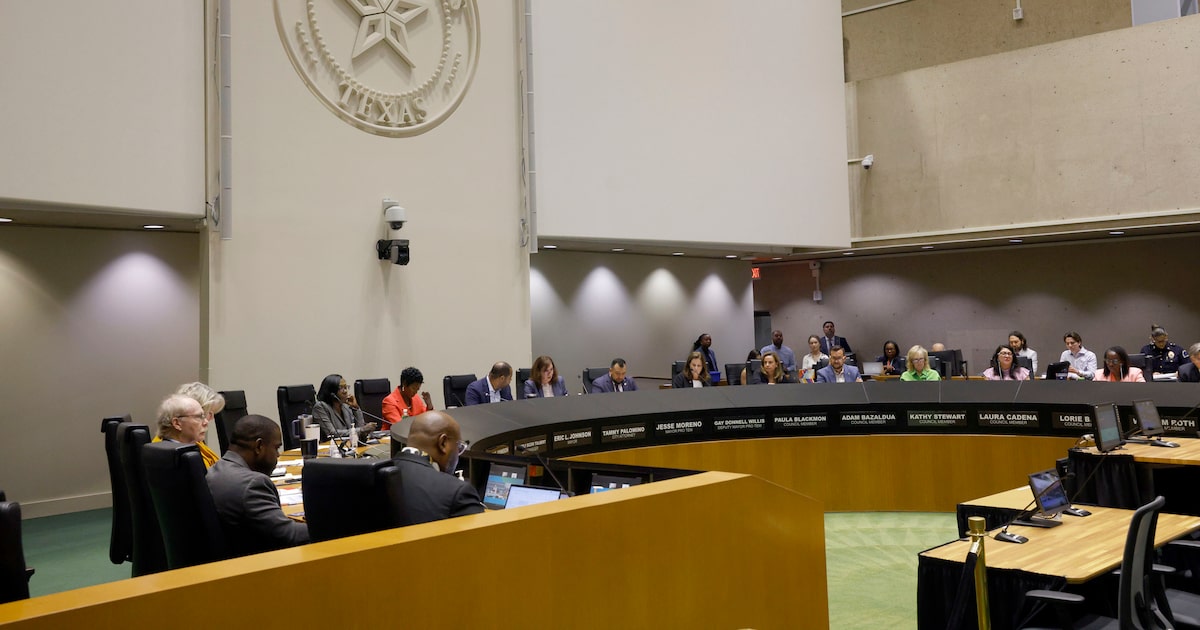Dallas residents — without a senior exemption — are unlikely to get a lot of relief in their bills in the upcoming fiscal year.
Under the city’s proposed $5.2 billion budget, budget officials want to raise service fees related to water and trash pickup by 4.6%.
Homeowners could see their tax bills reduced by about $13, but water and trash fees would increase by about $70 annually. The $36 environmental clean-up fee will remain unchanged.
Those with a senior exemption, however, could see their tax bills reduced by $156, and relief could outweigh the fee hike and result in savings of about $87.
Political Points
City Manager Kimberly Bizor Tolbert’s budget proposal, unveiled Friday, came against the backdrop of an uncertain financial landscape. Almost every local government in the country is in the midst of deep budgetary cuts. Earlier this year, Houston faced a $330 million budget shortfall, while Austin had a $33 million gap.
In Dallas, sales tax collections have stagnated and are not growing at the rate officials anticipated, while property tax disputes have further diminished the city’s revenue. Meanwhile, costs continue to rise nationwide.
“Our commitment is to continue to listen, continue to be fiscally prudent, making sure that we’re addressing our core services across the city, and making sure that as we prepare for upcoming budgets, we will continue to fine-tune our priority-based budgeting approach,” Tolbert said Friday during The Dallas Morning News editorial board meeting.
The fee hike is not as steep as it was last year, when the city first introduced the new annual environmental clean up fee to fund its efforts to clean and maintain public rights-of-way.
The increase is tempered by a slight decline in the property tax rate, and a landscape where property values didn’t nearly skyrocket the way they did the year prior, according to Dallas County Appraisal District data.
The city defines the average homeowner as someone with a residence that has a median market value of $382,010.
City officials, over the past couple of months, combed the budget to overcome a $36.5 million funding gap, about 2% of the $1.96 billion the city expected to collect.
In the proposed budget, up $200 million this year, officials have prioritized first responder services, modernization through automation and artificial intelligence, and have plans to use federal dollars to make investments in homeless services.
They have proposed reducing the rate by half a penny from 70.47 cents per $100 to 69.97 cents per $100. If approved, it would be the tenth consecutive year the city has reduced its tax rates. Dallas derives most of its revenue from property taxes, and the city will forgo $11 million in revenue with the new tax rate.
Homestead exemptions could also have a far more dramatic effect this year.
A typical homeowner can claim a homestead exemption, 20% of their home’s taxable value.
Meanwhile, residents 65 and over or who had a disability get additional relief under an elevated exemption level. Each resident’s tax burden will be dependent on whether their property values have risen or not and by how much.
In June, the City Council increased the homestead exemption for residents 65 and older or have disabilities from $153,400 to $175,000, marking the seventh time the city increased its exemption level since 2017.
Residents aged 65 and over represent the fastest growing segment of the city’s population, according to a 2024 report compiled by the city’s senior affairs commission. The group accounts for about one-third of the city’s total growth over the past decade.
City projections show the average Dallas homeowner without a senior homestead exemption could expect to pay about $57 more due to hiked service fees.
Since fiscal year 2020-21, fees related to water and trash pickup have increased by 27%. The biggest increase in services in all these years have come from water and wastewater costs that have grown by 21%. Sanitation fees have also gone up by 31% in the same time period.
The city, which is transitioning trash pick up from alleys to curbside, also has plans to charge residents an additional fee should they choose to stick with their alleys (those who move to curbside will save $1 a month).
Clarification: This story has been updated to include that residents currently with alley pickup will save a $1 per month if they are switched to curbside.
